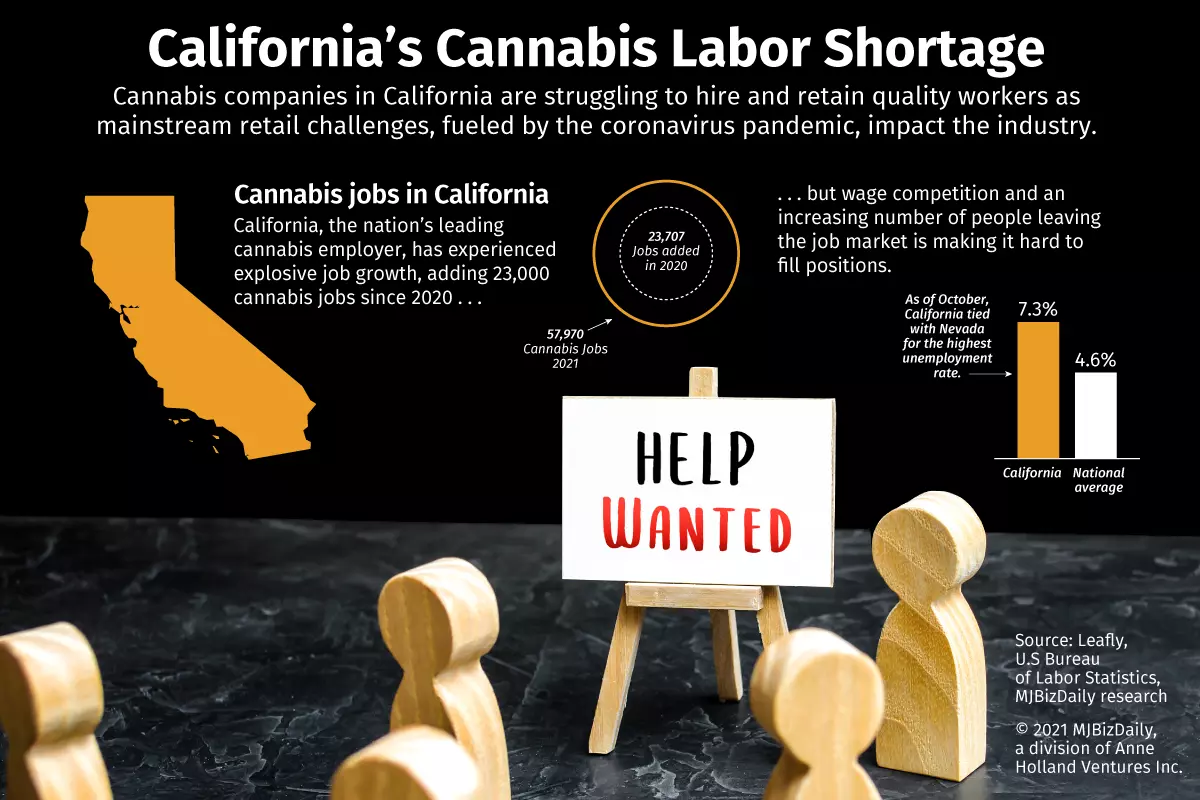Marijuana companies in California are struggling to recruit and retain quality workers, from consumer-facing budtenders and delivery drivers to operations specialists and packagers.
The hiring challenges reflect mainstream retail woes and the revolutionary shift underway in the labor market fueled by the COVID-19 pandemic, a push for remote work and flexibility and the “Great Resignation” in which employees are voluntarily quitting their jobs in droves.
It’s a scenario that’s no doubt occurring in other state-legal cannabis markets across the country beyond California.
“In cannabis retail in the last six or seven months, I’ve never seen this kind of turnover,” said Jerred Kiloh, owner of Los Angeles cannabis shop The Higher Path.
“Some people are a little disenchanted about what the future of California cannabis really looks like.”
Kiloh, who launched the dispensary eight years ago in Sherman Oaks, said he can’t afford to pay “huge salaries” while his store struggles to compete against a thriving illicit market, where eighths of flower sell for as little as $15.
“Everyone is starting to value their labor more than I’m willing to pay,” he added.
“They think they’re going to return to the general market and find more money, but I think they’re going to be rudely surprised that most retailers are thinning out, scaling down their labor and trying to survive.”
Phoenix-based 4Front Ventures is trying to fully staff its newly opened, 170,000-square-foot cultivation and processing plant in the city of Commerce, which borders L.A.
A lack of quality applicants and “shockingly low” response rates led the multistate operator to reevaluate starting salaries and boost compensation, said Josh Krane, 4Front’s vice president of operations in California.
Hourly wages start above $17. Machine operators earn well over $20 an hour, based on experience.
But the company, which has hired nearly 65 workers to handle single-shift production, still has more than a dozen openings, including machinist, packaging and logistics jobs.
“I’ve been hiring people 20-something years and it’s never been this difficult,” Krane said. “It’s certainly never been this difficult in cannabis.”
A double whammy
California’s high living costs – particularly near the coast – are a major consideration for job seekers, who now have plenty of options and bargaining power.
Cannabis brands in California must offer hourly rates in the $18-$20 range to attract top candidates, said Melita Balestieri, vice president of marketing and business development at Sonoma-based Higher Growth, a cannabis recruiting agency.
“We’re competing against the Best Buys of the world, the Amazons of the world, that will pay more for entry-level workers,” Balestieri said.
“It’s just too competitive of an environment.”
Stay informed with MJBiz Newsletters
MJBiz’s family of newsletters gives cannabis professionals an edge in this rapidly changing industry.
Featured newsletters:
- MJBizDaily: Business news for cannabis leaders in your inbox each morning
- MJBiz Cultivator: Insights for wholesale cannabis growers & vertically integrated businesses
- MJBizCon Buzz: Behind-the-scenes buzz on everything MJBizCon
- MJBiz Retail + Brand: New products, trends and news for cannabis retailers, distributors and marketers
- Hemp Industry Week: Roundup of news from hemp farming to CBD product manufacturing
- And more!
Several cannabis brands told MJBizDaily that job applicants these days are more selective than ever and believe their value is determined more by their actual production than their experience level or previous pay grade.
Some suggested the labor shortage is a consequence of coronavirus-related federal stimulus checks distributed in 2020 and earlier this year as well as pandemic-era unemployment benefits programs, which ended in September.
The programs funneled billions of dollars into the pockets of both the employed and the unemployed, giving many a financial cushion and allowing some to be pickier about jobs and returning to work.
“Cannabis is not immune from the ‘Great Resignation’ or the social welfare net the government has given for COVID,” said David Belsky, founder and CEO of Manhattan Beach-based cannabis recruiting and staffing agency FlowerHire.
According to the U.S. Department of Labor, more than 4.4 million U.S. workers quit their jobs in September, the fourth consecutive monthly record.
California workers are leading the exodus, nudging the country’s highest unemployment rate in October to 7.3%, tied with Nevada. The national average was 4.6%.
November closed with more than 10 million job openings nationwide, according to the U.S. Bureau of Labor Statistics.
The federal government doesn’t track cannabis jobs, but a search on Indeed resulted in more than 2,400 openings in California, ranging from hourly gigs in budtending and customer service to six-figure salaries in event production and cultivation.
According to the Seattle-based cannabis website Leafly, California had nearly 58,000 cannabis jobs through January 2021, up 69% since 2019, or roughly 23,700 jobs.
Though living near work is no longer a requirement for many jobs, cannabis operations are local in nature, considering most employment is in retail, processing, manufacturing and cultivation.
Transporters wanted
Drivers, in particular, are in demand.
“The biggest gaps I’ve seen in hourly workforce hiring for cannabis companies in California is drivers,” Belsky said.
Tradecraft Farms received its delivery license in summer 2020 for its dispensary in Vista, about 40 miles north of San Diego. It took more than a year to hire four drivers.
Two were hired a few months ago.
“We didn’t have an issue keeping drivers, we had an issue finding them,” said Christina Tinoco, Tradecraft’s regional retail manager.
“We even had to limit our hours to have a delivery system.”
Competition for drivers is fierce in California, given that the state is home to Uber, Lyft, and Instacart as well as dozens of cannabis delivery providers, including giants Eaze and Caliva.
Uber and Lyft, according to industry watchers and news reports, have been facing a driver shortage because of coronavirus-related concerns.
The companies have been offering generous bonuses to help fill their ranks, providing added competition to cannabis companies struggling to hire drivers.
The crunch is so severe that California’s Division of Motor Vehicles announced plans last month to double the capacity for commercial driving tests to nearly 10,000 per month and expand hours on Saturdays.
New strategies and tactics
To combat the labor shortages, California cannabis operators are getting more creative and flexible in recruitment and retention.
Tradecraft now trains new hires for every role at its store in Vista and Port Hueneme in Ventura County, not only to prevent monotony and burnout but also turnover upheaval.
“We had a few people leave at once, and it left our store in shambles,” Tinoco said.
The company also started providing commissions to budtenders, who can easily earn an additional $1,000 per month, she added.
Beyond Hello, which operates dispensaries in Santa Barbara and Palm Springs, developed an applicant tracking system that blasts postings to more than 150 job sites.
“Utilizing technology has been so key because it makes everything so visible right away,” said Clifton Lambert, director of retail human resources at Florida-based Jushi Holdings, which owns Beyond Hello.
Through a mix of job sites, city resources and local staffing agencies, hiring fairs and newspaper ads, 4Front has found moderate success recruiting disgruntled employees from nearby food packagers and manufacturers as well as workers who recently were laid off or lost jobs in other industries.
4Front has even resorted to placing flyers seeking workers on parked cars in nearby processing plants and food courts.
“Maybe they’re burnt out on their job or got passed over for that promotion,” Krane said. “Very few people are coming to us from other cannabis operators.”
Chris Casacchia can be reached at ccasacchia@hotmail.com.





